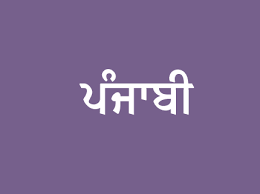Language/Panjabi/Grammar/Past-Tense
As a Panjabi language teacher, I understand that learning how to use verbs in the past tense is critical for students who want to express themselves appropriately in Panjabi. In this lesson, we will explore the past tense in Panjabi, including how to form sentences about past events.
Understanding the Past Tense
The past tense in Panjabi is used to describe completed actions or events that occurred at a specific time in the past. To form the past tense, verbs must undergo inflection to indicate that the action has been completed in the past.
In Panjabi, the past tense is typically formed by adding the suffix "ਆ" (aa) to the stem of the verb. However, some verbs may undergo additional changes. Here are some examples:
| Panjabi | Pronunciation | English |
|---|---|---|
| ਖਾਣਾ (khaana) | khaa-na | to eat |
| ਖਾਇਆ (khaaiaa) | khaa-i-aa | ate |
| ਪੜਨਾ (parhna) | parh-na | to read |
| ਪੜਿਆ (pariaa) | par-i-aa | read |
In the examples above, the stem of the verb "ਖਾਣਾ" (khaana) is "ਖਾ" (khaa). To form the past tense, we add the suffix "ਆ" (aa) to get "ਖਾਇਆ" (khaaiaa), which means "ate." Similarly, the stem of the verb "ਪੜਨਾ" (parhna) is "ਪੜ" (parh). To form the past tense, we add the suffix "ਿਆ" (iaa) to get "ਪੜਿਆ" (pariaa), which means "read."
It's important to note that the past tense verbs in Panjabi do not change depending on the subject of the sentence. This means that they are not conjugated like verbs in other languages, such as French or Spanish.
Forming Sentences in the Past Tense
To form a sentence in the past tense, we must use a subject, a verb in the past tense form, and an object (if applicable). Here is an example:
Panjabi: ਮੈਂਨੇ ਖਾਣਾ ਖਾਇਆ। Pronunciation: main-ne khaana khaa-iaa. English: I ate food.
In the example above, "ਮੈਂਨੇ" (main-ne) means "I," "ਖਾਇਆ" (khaaiaa) means "ate," and "ਖਾਣਾ" (khaana) means "food."
Here are some more examples of sentences in the past tense:
- ਉਸਨੇ ਪੜਿਆ ਕਿਤਾਬ। (usne pariaa kitaab): He read a book.
- ਤੁਸੀਂ ਕਿਹਾ ਸੀ। (tusi kihaa si): You said.
Using Time Expressions
To indicate the time when an action or event occurred, we can use time expressions in the sentence. Time expressions are usually placed at the beginning or the end of the sentence. Here are some examples:
- ਕਲ ਮੈਂਨੇ ਖਾਣਾ ਖਾਇਆ। (kal main-ne khaana khaaiaa): Yesterday, I ate food.
- ਪਿਛਲੇ ਹਫ਼ਤੇ ਉਸਨੇ ਪੜਿਆ ਕਿਤਾਬ। (pichle haft-e usne pariaa kitaab): Last week, he read a book.
- ਦੋ ਘੰਟੇ ਪਹਿਲਾਂ ਤੁਸੀਂ ਕਿਹਾ ਸੀ। (do ghan-t-e pahlaan tusi kihaa si): Two hours ago, you said.
Irregular Verbs in the Past Tense
While most Panjabi verbs form their past tense by adding the suffix "ਾ" (aa), some verbs are irregular and do not follow this pattern. Here are some examples:
| Panjabi | Pronunciation | English |
|---|---|---|
| ਜਾਣਾ (jaana) | ja-ana | to go |
| ਗਏ (ge) | ge | went |
| ਆਉਣਾ (auna) | aa-u-na | to come |
| ਆਇਆ (aiaa) | aa-i-aa | came |
In the examples above, notice that the stems of the verbs "ਜਾਣਾ" (jaana) and "ਆਉਣਾ" (auna) do not end in the vowel "ਆ" (aa). Instead, they have their own unique past tense forms: "ਗਏ" (ge) and "ਆਇਆ" (aiaa).
Other irregular verbs in the past tense include "ਹੋਣਾ" (hona) which means "to be" and "ਕਰਨਾ" (karna) which means "to do." The past tense forms of these verbs are "ਹੋਇਆ" (hoiaa) and "ਕੀਤਾ" (keetaa), respectively.
Tips for Practicing the Past Tense
To reinforce your understanding of the past tense in Panjabi, try the following exercises:
- Write short stories in the past tense.
- Practice conjugating verbs in the past tense.
- Watch Panjabi movies or TV shows and pay attention to the use of the past tense in the dialogue.
By consistently practicing the use of the past tense, you will gain confidence in your ability to communicate effectively in Panjabi.

